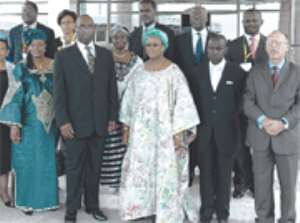
President J. A. Kufuor yesterday established a firm link between human rights and economic development and called on African institutions to help educate Africans on their rights, as well as their responsibilities.
“All of us, civil society, the media and all those who have had the privilege of knowing about the provisions of the African Charter on Human and Peoples Rights (ACHPR), must take ownership of its provisions and be responsible for its promotion in a structured and organised manner across Africa,” he entreated Africans at the 41st Ordinary Session of the ACHPR in Accra.
In a speech read on his behalf, the President said although the commission had been involved in the promotion of the charter in member countries, the existence and provisions of the charter were still little known among the continent's people.
He affirmed his personal affection for the provisions in the Women's Protocol and said as a result he had instructed the Attorney-General and Minister of Justice, the Ministers of Foreign Affairs, Regional Integration and NEPAD and Women and Children's Affairs to take immediate steps to ensure that the protocol was ratified by Ghana's Parliament.
President Kufuor also urged the commission to take up the leadership role, since that was part of its mandate to galvanise the rest of Africa along the path of peace and development.
He urged the commission to re-assess its strengths and weaknesses to enhance its operations for the promotion and protection of human and peoples' rights on the continent, since self-assessment was necessary in the process of development.
President Kufuor, who is also Chairman of the African Union (AU), advised the commission to examine its relationship with other regional institutions, such as the African Court on Human and Peoples Rights.
He said with the fusion of the court with the African Court of Justice, Africa had shown commitment to take the promotion and protection of fundamental human and peoples rights to another level.
Touching on gender equality on the continent, President Kufuor said apart from making it one of the cardinal principles of the AU under Article 4 (1) of the Constitutive Act, 2000, the AU had gone a step further to adopt a protocol to specifically address the rights of women in Africa.
He said state parties to the Women's Protocol were under an obligation to take legislative, administrative and other steps to ensure gender equality in their respective jurisdictions.
“The key provisions of the Women's Protocol are the elimination of discrimination against women, the elimination of harmful practices, access to justice and equal protection before the law, the right to education, the right to dignity, reproductive health rights, widows' rights, property rights and special protection for women with disability,” he outlined.
He underlined that those rights were crucial to the emancipation and development of women on the continent.
The Chairperson of the commission, Madam Salamata Sawadogo, noted that human rights issues were at the heart of development and the foundation for peace, saying that Africans deserved an end to torture and to live in dignity.
According to her, peace and integration were possible if African leaders respected the human rights of their peoples.
For her part, the AU Commissioner for Political Affairs, Mrs Julia Dolly Joiner, called on African leaders to move away from the rhetoric to provide the needed logistics to enable the commission to work hard.
The Zimbabwean Minister of Justice, Legal and Parliamentary Affairs, Mr Patrick Chinamasa, noted that dependence on foreign aid to implement the programmes of the AU had the tendency of making the providers to conceptualise and dictate their understanding of human rights to Africans.
He stressed the need for the AU to conduct issues dispassionately in a way that it would be able to separate facts from fiction.
Story by Albert K. Salia




 Chairman Kingsley Owusu Brobbey calls for Privatization of Electricity
Chairman Kingsley Owusu Brobbey calls for Privatization of Electricity
 Train accident: Four more grabbed and remanded
Train accident: Four more grabbed and remanded
 Gov't to consolidate cash waterfall revenue collection accounts
Gov't to consolidate cash waterfall revenue collection accounts
 Gov't to settle lump sum for retired teachers by April 27
Gov't to settle lump sum for retired teachers by April 27
 Former PPA CEO granted GH₵4million bail
Former PPA CEO granted GH₵4million bail
 Dumsor: The darkness has exposed you; you’ll go down as the worst in Ghana’s his...
Dumsor: The darkness has exposed you; you’ll go down as the worst in Ghana’s his...
 Dumsor: The ‘incompetent’ person provided a timetable whiles those who came to s...
Dumsor: The ‘incompetent’ person provided a timetable whiles those who came to s...
 Defend, ensure NPP’s good works are ‘sold’ and highlight the ‘bad’ state of the ...
Defend, ensure NPP’s good works are ‘sold’ and highlight the ‘bad’ state of the ...
 Bawumia will rank high ahead of Mahama in any anti-corruption test — Salam Musta...
Bawumia will rank high ahead of Mahama in any anti-corruption test — Salam Musta...
 NPP trying to bribe us but we‘ll not trade our integrity on the altar of corrupt...
NPP trying to bribe us but we‘ll not trade our integrity on the altar of corrupt...
